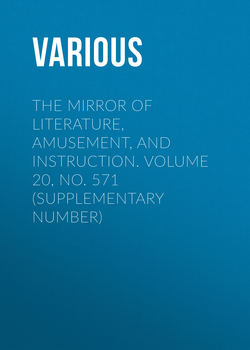Читать книгу The Mirror of Literature, Amusement, and Instruction. Volume 20, No. 571 (Supplementary Number) - Various - Страница 6
FIRST LITERARY ATTEMPTS
ОглавлениеAbout this time Sir Walter employed his leisure in collecting the ballad poetry of the Scottish Border. His inducement to this task was subsequently described by him as follows:—
"A period," says Sir Walter, "when this particular taste for the popular ballad was in the most extravagant degree of fashion, became the occasion, unexpectedly indeed, of my deserting the profession to which I was educated, and in which I had sufficiently advantageous prospects for a person of limited ambition. * * I may remark that, although the assertion has been made, it is a mistake to suppose that my situation in life or place in society were materially altered by such success as I attained in literary attempts. My birth, without giving the least pretension to distinction, was that of a gentleman, and connected me with several respectable families and accomplished persons. My education had been a good one, although I was deprived of its full benefit by indifferent health, just at the period when I ought to have been most sedulous in improving it." He then describes his circumstances as easy, with a moderate degree of business for his standing, and "the friendship of more than one person of consideration, efficiently disposed to aid his views in life." In short, he describes himself as "beyond all apprehension of want." He then notices the low ebb of poetry in Britain for the previous ten years; the fashionable but slender poetical reputation of Hayley, then in the wane; "the Bard of Memory slumbered on his laurels, and he of Hope had scarce begun to attract his share of public attention;" Cowper was dead, and had not left an extensive popularity; "Burns, whose genius our southern neighbours could hardly yet comprehend, had long confined himself to song-writing; and the realms of Parnassus seemed to lie open to the first bold invader." The gradual introduction of German literature into this country during such a dearth of native talent, now led Sir Walter to the study of the German language. He also became acquainted with Mr. G. Lewis, author of The Monk, who had already published some successful imitations of the German ballad school. "Out of this acquaintance," says Sir Walter, "consequences arose, which altered almost all the Scottish ballad-maker's future prospects of life. In early youth I had been an eager student of ballad poetry, and the tree is still in my recollection, beneath which I lay and first entered upon the enchanting perusal of Percy's Reliques of Ancient Poetry. The taste of another person had strongly encouraged my own researches into this species of legendary lore; but I had never dreamed of an attempt to imitate what gave me so much pleasure." He then speaks of some successful metrical translations which he made at the High School; but in original rhyme he was less fortunate. "In short," says Sir Walter, "except the usual tribute to a mistress' eyebrow, which is the language of passion rather than poetry, I had not for ten years indulged the wish to couple so much as love and dove, when finding Lewis in possession of so much reputation, and, conceiving that, if I fell behind him in poetical powers, I considerably exceeded him in general information, I suddenly took it into my head to attempt the style by which he had raised himself to fame." Sir Walter next hearing a striking passage from Mr. W. Taylor's translation of Bürger's Leonore, was induced to procure a copy of the original poem from Germany, and "the book had only been a few hours in my possession, when I found myself giving an animated account of the poem to a friend, and rashly added a promise to furnish a copy in English ballad verse. I well recollect that I began my task after supper, and finished it about daybreak the next morning, (it consists of 66 stanzas,) by which time the ideas which the task had a tendency to summon up, were rather of an uncomfortable character." This success encouraged Sir Walter to publish his translation of Leonore with that of Der Wilde Jager (the Wild Huntsman,) in a thin quarto; but, other translations appearing at the same time, Sir Walter's adventure proved a dead loss: "and a great part of the edition was condemned to the service of the trunk-maker." This failure did not discourage Sir Walter; for, early in 1799 he published Goetz of Berlinchingen, a tragedy, from the German of Goëthe. We thus see that Sir Walter did not conceal his obligation to Lewis, for his aid in his translations; but Lord Byron's assertion that Monk Lewis corrected Scott's verse, and that he understood little then of the mechanical part of it—is far from true, as a comparison of their productions warrants us to conclude.
